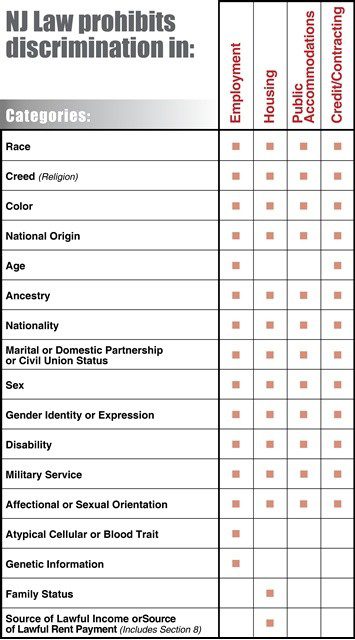The New Jersey Law Against Discrimination (NJ LAD) is a complex law that prohibits unlawful discrimination in four distinct areas:
- Employment
- Housing
- Places of Public Accommodation
- Credit and Business contracts
Here is a great graphic from the NJ Division of Civil Rights that gives an overview of the 4 categories and the class of individuals protected under this law.
When it comes to employment matters, NJ LAD prohibits intentional discrimination. This means differential treatment, statements or conduct that reflects a discriminatory animus or bias. This comes in to play on matters of wrongful discrimination on the basis of any of the law’s specified protected categories in any job-related action – including recruitment, interviewing, hiring, promotions, discharge, or compensation as well as the terms, conditions and privileges of employment. The law also applies to matters of Sexual Harassment and Hostile Work Environment.
Differences between NJ LAD and Federal Law
In the area of employment, at times the NJ LAD mirrors Federal Anti-Discrimination laws and/or expands the definition of who is protected or impacted.
Age discrimination under NJ LAD protects persons over 18 years of age whereas Federal Law applies at 40 years of age.
NJ LAD applies to companies with one or more employees, whereas Federal Laws apply to companies with 15 or more employees.
The EEOC requires a charge be filed within 180 days from when the discrimination took place (although due to NJ LAD overlapping with Federal Law, that time frame increases to 300 calendar days). Under NJ LAD, discrimination charges must be filed within 180 days of an incident or violation.
Under the NJ LAD, one has an option to take the “Administrative Path” to handle a complaint through the NJ Division of Civil Rights, or go directly to the Superior Court of New Jersey. The Administrative Path is subject to the 180-day time frame mentioned above. Going through the courts allows a two-year window to file a complaint.
Compare this to the EEOC, which requires that all discrimination claims be filed through an EEOC administrative path except for claims under the Equal Pay Act. In the case of Equal Pay Acts, claims must be filed within two or three years depending on the nature of the allegations (willful vs non-willful violations).
Other Areas the NJ LAD Covers
Employers are specifically prohibited from:
Publishing any employment advertisement that directly or indirectly expresses any limitation, specification, preference or discrimination based on any of NJ LAD’s protected characteristics.
Discriminating against an employee in compensation or terms or conditions of employment for displaying the American flag on the employee’s person or workstation, as long as the display does not interfere with the employee’s job duties.
Denying an otherwise qualified person with a disability the opportunity to obtain or maintain employment (or to advance his or her position) solely because he or she is accompanied by a service or guide dog.
Insurance Protection for NJ LAD Claims
A well-crafted Employment Practices Liability policy will provide the fundamental protections to a company for claims under NJ LAD. Not every Employment Practices Liability policy offers the same protection. A careful review of the coverages will help you understand what the policy does or doesn’t cover. Contact us to find out more about this coverage and determine how your current coverage might protect you for NJ LAD claims.
To business owners or non-profit organizations the NJ Law Against Discrimination brings another layer of regulation with which to contend with. This article is not exhaustive in its analysis of the law, but designed to bring a fundamental attention to it.

